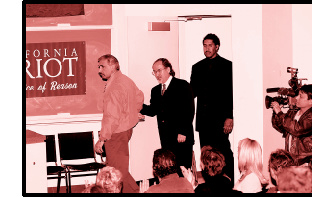

|

|

|

|
| |
|
|
|
David Horowitz's new campaign attacking reparations for African-Americans is becoming the right-wing equivalent of the Energizer bunny--it keeps going and going and going. In what began as an effort to place an anti-reparations ad in college newspapers across the country, Horowitz has garnered more media attention for himself than at any other time since the former leftist turned conservative 16 years ago. Rupert Murdoch's conservative Fox News channel is becoming Horowitz's personal soapbox, dozens of conservative columnists and talk-radio hosts are singing his praises, and several daily newspaper editorial boards have supported him. After the editors of the Harvard Crimson refused to run the ad, liberal journalists Anthony Lewis and David Halberstam wrote the student newspaper, expressing their disappointment because they "thought the Crimson stood for freedom of the press" and had "the courage" to exercise that right. Horowitz has become the prince of conservative politics. A well-known leftist in the
Horowitz's latest stunt began on February 28--the last day of Black History Month--when he approached the University of California at Berkeley's student-run newspaper, The Daily Californian, about running the ad. Headlined "Ten Reasons Why Reparations for Slavery is a Bad Idea--and Racist Too," the ad lays out Horowitz's anti-reparations position, plugs his latest book, The Death of the Civil Rights Movement, and solicits money for his Los Angeles-based center. According to Media Transparency, a Web site tracking the money behind the right, over the past decade right-wing foundations have ponied up some $9 million for the center--including more than $3 million from the Milwaukee-based Lynde and Harry Bradley Foundation. At press time, Horowitz had sent ads to 57 college papers--34 had rejected the ad, 14 printed it (three with apologies) and 9 were still undecided. Horowitz is giving those who rejected the first ad an opportunity to rethink their decision, offering them a second ad to use as an op-ed piece. A week after the ad appeared in Berkeley's Daily Californian, Horowitz (accompanied by campus police and two personal bodyguards) spoke at a gathering sponsored by the Berkeley College Republicans. According to the student newspaper, the sponsors pulled the plug during the question-and-answer period when "the crowd became raucous, with yelling and cheering on both sides of the aisle." At Brown University in Providence, Rhode Island, student editors published the ad in mid-March and the next day discovered that the entire press run had disappeared from campus newspaper racks. Several days later the ad was reprinted and the paper delivered with police protection. Interim Brown President Sheila Blumstein told The Associated Press that she supported the decision to run the ad and that the theft of the papers would be investigated. At the University of Wisconsin at Madison, the Badger Herald ran the ad. Editor-in-Chief Julie Bosman explained on NPR's Talk of the Nation that although the advertising department was responsible for the decision, she felt the "content of the ad was well within the discourse of a college paper." Bosman also said that she had heard that "stacks of papers were stolen and thrown into trash cans on campus." The paper's editorial board later refused to publish a counter-ad labeling the Horowitz campaign "racist propaganda." These episodes provide a window into one aspect of the political strategy Horowitz elaborates in "The Six Principles of Political War," a piece posted last August on his Web site (www.frontpagemag.com). First, he says or writes something incendiary about African-Americans. Called on it, criticized and sometimes labeled a racist, Horowitz then cries out that he's a victim of left-wing censorship, casting himself as a First Amendment martyr. The debate is no longer focused on the merits of the issue--in this case, reparations for African-Americans. Instead Horowitz has successfully turned the entire affair into a self-aggrandizing media blitz, gaining a platform for condemning the bankruptcy of the left, intolerance of student radicals and political correctness on campus. In this case, Horowitz's plan is to build opposition to the reparations movement among black conservatives and his white supporters. By setting off this pre-emptive strike against reparations, he gets to define the issue on his own terms. Regardless of Horowitz's schemes, the debate over reparations has begun to gain steam around the country. Since 1989, Rep. John Conyers (D-Michigan) has introduced a bill to begin a full congressional examination of the issue. And last June, Rep. Tony Hall (D-Ohio) introduced legislation to formally apologize for the government's role in slavery. Horowitz's book, The Art of Political War, is becoming a
valuable organizing tool for right-wing activists across the country.
Shawn Steel, a board member for the Study of Popular Culture and
the new chairman of the California State GOP, distributed 3,500
copies to party members around the state. Nationally, the conservative
Heritage Foundation also distributed more than 2,500 copies. This
publication should be a must-read for progressives, too--since it's
clear there will be more of these campaigns in the years to come.
|


